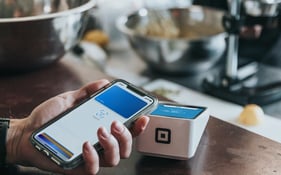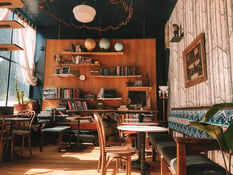Even in this job hunters market, interviews are nerve-racking. You may be infinitely qualified, but there are so many unknowns! So control what you can, and make a solid first impression. Research suggests this happens in a blink (read: one-tenth of a second), making your outfit a huge component of your success.
Once upon a time you could just wear a nifty ensemble and be confident that was the move. These days, the definitions are always sliding around. If you can hang onto just one truism, go with what my father always told me: It is better to be overdressed than underdressed.
So what does that mean, exactly, when you’re getting ready to go for a restaurant job interview? (And when you're quite possibly googling “what to wear to get a restaurant job” 20 minutes before you have to leave your apartment. No shame, we’ve all been there.) Let's start by defining some terms and setting some boundaries.
What kinds of clothes can you wear to a restaurant job interview?
Your baseline dress code for most restaurants is a nebulous fashion Switzerland (read: neutral) known as smart casual. Consider this your go-to, so long as the restaurant isn’t overly hip. Generally speaking: tailored pants or a skirt, a button-down shirt or blouse, a “conservative” casual dress. Casual shoes (but not trainers or sandals) in dark colors. These basics tend to jive for menswear, womenswear, or ensembles that draw inspiration from both sides of the rack.
At a more upscale restaurant, you want to step it up to business casual. Think: jacket or sweater, tailored pants or a skirt, button-down shirt or blouse, a “conservative” dress. Leather footwear becomes the rule for both men’s outfits and for women’s.
Go up one more weight class to your high-end fine dining establishments (or to your more conservative restaurant chains) and you should rock the full-on business formal. Now we’re talking a tailored suit, a pressed shirt or blouse, a tie (for men), and polished leather dress shoes or pumps/ballet flats. You’re no longer dressing for comfort so much as you’re dressing to impress.
Here’s what you didn’t just read: jeans, sneakers, T-shirts, leggings as pants, sweatpants, hoodies, or rubber shoes of any kind. If any of these items are spread across your bed right now, tuck ‘em back in the closet. Now put on something that fits well and is wrinkle-free.
When you’re choosing among these broad categories of dress to present the most hirable version of yourself, you should bear a few things in mind. This will require a smidge of homework. But once you set yourself up to look and feel great in the interview, your confidence will show. You will seem like a person who ought to be paid to come back. It’ll feel great.
Here’s how to do that.
Step 1: Know your audience
You have to ask, what is this restaurant known for? Yes, that’ll help you study up on Austrian wines or the herbs in Z’atar. But it also should clue you into the dress code/fashion culture. If you’re interviewing at most corporate chain restaurants, business casual is your answer. They prize consistency. They have a mold, and you fit it. Truly, don’t overthink it.
For high-end fine dining establishments, business formal is what you’ll be serving that $700 Pomerol in. For the local hip eatery with local art on the walls, smart casual is all you need.
No matter the location, show the hiring managers from the minute you open the door that you fit their culture. In hospitality, the ability to read the room is actually part of a core skill set. Your clothes are a chance to demonstrate that you understood the assignment.
Step 2: Dress strategically
Make sure you’re comfortable! The cutest outfit in the world will sabotage you if it has you shifting around, unable to focus. You want to avoid clothing that is too tight anyway, but being fidgety is arguably a worse offense. Put on something that relaxes you. It’ll help you put your best, most sharply attired foot forward.
Step 3: Show the precise right amount of personality
Your grandfather’s watch or a handmade necklace from Sri Lanka can be great conversation pieces and a chance to show off your charm. And if you like to wear big accessories, plus the environment is full of personality, go for it. If you are unsure, skip it. If you know it is a conservative environment, skip it. If you are not someone who wears statement pieces, see Step 2 and leave the giant earrings at home.
In any event, crank up the charm! Talking to strangers should be easy by this point, but it’s always harder when you’re on the line. At the very least, both you and the interviewer want to find a good fit. Everyone says it for a reason: Be yourself.
Step 4: Put on your happy face
Smiles are the linchpin of service, for better or worse. And while the service industry is seeing a bit of a reckoning, it is still the service industry. In two weeks, you’ll be gleefully complaining along with the interviewer over smokes in the alley. For now? Focus on your favorite things about food service.
Step 5: To ace the interview, rehearse first
Prepare your answers! The hiring manager is going to ask you why you want to work there, what you like about restaurants, and a whole host of other interview questions. Game out the likely questions, brush up your favorite anecdotes, and get your answers ready! They want to see some enthusiasm for the establishment, most of all. And your hoodie least of all.
[Photo by Egor Gordeev on Unsplash]





